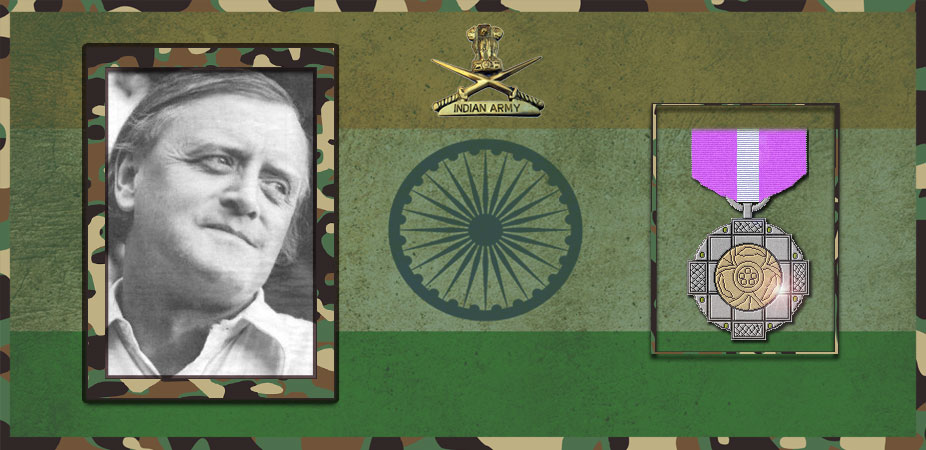Let's salute to our Indian Army together, We are proud to be Indian.
Let's salute to our Indian Army together, We are proud to be Indian.

Verrier Elwin (29 August 1902 – 22 February 1964) was a British self-trained anthropologist, ethnologist and tribal activist, who began his career in India as a Christian missionary. He was a controversial figure who first abandoned the clergy, to work with Mohandas Gandhi and the Indian National Congress, then converted to Hinduism in 1935 after staying in a Gandhian ashram,and split with the nationalists over what he felt was an overhasty process of transformation and assimilation for the tribals. Elwin is best known for his early work with the Baigas and Gonds of Orissa and Madhya Pradesh in central India, and he married a member of one of the communities he studied there. He later also worked on the tribals of several North East Indian states especially North-East Frontier Agency (NEFA) and settled in Shillong, the hill capital of Meghalaya.
In time he became an authority on Indian tribal lifestyle and culture, particularly on the Gondi people. He served as the Deputy Director of the Anthropological Survey of India upon its formation in 1945. Post-independence he took up Indian citizenship. Prime Minister Jawaharlal Nehru appointed him as an adviser on tribal affairs for north-eastern India, and later he was Anthropological Adviser to the Government of NEFA (now Arunachal Pradesh.His autobiography, The Tribal World of Verrier Elwin won him the 1965 Sahitya Akademi Award in English Language, given by the Sahitya Akademi, India’s National Academy of Letters
Harry Verrier Holman Elwin was born on 29 August 1902 in Dover, the son of Edmund Henry Elwin, Bishop of Sierra Leone. He was educated at Dean Close School and Merton College, Oxford, where he received his degrees of BA First Class in English Language and Literature, MA, and DSc. He also remained the President of Oxford Inter-Collegiate Christian Union (OICCU) in 1925.
In 1926 he was appointed Vice-Principal of Wycliffe Hall, Oxford and in the following year he became a lecturer at Merton College, Oxford. He went to India in 1927 as a missionary. He first joined Christian Service Society in Pune. The first time he visited the central India, now the states of Madhya Pradesh, Chhattisgarh, and parts of eastern Maharashtra, was with an Indian from Pune, Shamrao Hivale. Their studies are on the tribes are some of the earliest anthropological studies in the country. Over the years he was influenced by the philosophies of Mahatma Gandhi and Rabindranath Tagore. He participated in the Indian independence movement and in 1930 Gandhi said he regarded Elwin as a son.
He came out with numerous works on various tribal groups in India, the best acclaimed being those on Maria and Baigas.
After India attained independence in 1947 he was asked by Nehru to find solutions to the problems that emerged among the tribal peoples living in the far northeastern corner of India, the North East Frontier Agency (NEFA). He was also a Fellow of the Indian National Science Academy.
The historian Ramachandra Guha’s biography Savaging the Civilized: Verrier Elwin, His Tribals, and India (1999) brought renewed attention in India to Elwin’s life and career.
Verrier Elwin wrote – The message of the ghotul – that youth must be served, that freedom and happiness are more to be treasured than any material gain, that friendliness and sympathy, hospitality and unity are of the first importance, and above all that human love – and its physical expression – is beautiful, clean and precious, is typically Indian.
Elwin married a Raj Gond tribal girl called Kosi who was a student at his school at Raythwar (Raithwar) in Dindori district in Madhya Pradesh on 4 April 1940. They had one son, Jawaharlal (Kumar), born in 1941. Elwin had an ex-parte divorce in 1949, at the Calcutta High Court, writing in his autobiography, “I cannot even now look back on this period of my life without a deep sense of pain and failure” In 2006 Kosi was still living in a hut in Raythwar, their son Kumar having died.Elwin remarried a woman called Lila, belonging to the Pardhan Gond tribe in nearby Patangarh, moving with her to Shillong in the early 1950s. They had three sons, Wasant, Nakul and Ashok. Elwin died in Delhi on 22 February 1964 after a heart attack.His widow Lila died in Mumbai in 2013, aged about 80, shortly after the demise of their eldest son, Wasant.